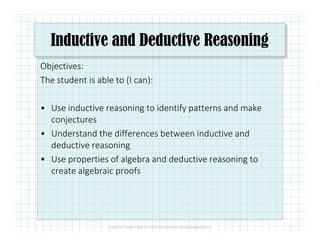Inductive and deductive arguments are two types of reasoning that are used to reach a conclusion. While they may seem similar, there are important differences between the two.
An inductive argument is one in which the conclusion is reached by considering a number of specific examples or observations. This type of argument relies on the idea that if a pattern is observed in a number of specific cases, it is likely to hold true for other cases as well. For example, if a person observes that every time it rains, the streets become wet, they might conclude that whenever it rains, the streets will become wet. Inductive arguments are usually based on probability, rather than certainty.
On the other hand, a deductive argument is one in which the conclusion is reached by starting with a general principle or law and applying it to a specific case. In a deductive argument, the conclusion is necessarily true if the premises are true. For example, if a person knows that all dogs are mammals and they see a specific animal that is a dog, they can deduce that the animal is a mammal. Deductive arguments are considered to be more reliable than inductive arguments, as they are based on certain principles rather than probability.
One key difference between inductive and deductive arguments is the way in which the conclusion is reached. Inductive arguments rely on observations and specific examples, while deductive arguments rely on general principles and laws. This means that inductive arguments are more prone to error, as they rely on patterns that may not hold true in all cases. In contrast, deductive arguments are considered to be more reliable, as they are based on certain principles that are considered to be true.
Another difference between the two types of arguments is the way in which they are used. Inductive arguments are often used in scientific research, as they allow researchers to draw conclusions based on observations and experiments. Deductive arguments, on the other hand, are often used in legal and philosophical contexts, as they allow people to apply general principles to specific cases.
In conclusion, inductive and deductive arguments are two types of reasoning that are used to reach a conclusion. While they may seem similar, they have important differences in the way they are used and the way in which the conclusion is reached. Inductive arguments rely on observations and specific examples, while deductive arguments rely on general principles and laws. Understanding the difference between these two types of arguments can be useful in a variety of contexts, from scientific research to legal and philosophical discussions.







